第87章
At sunrise the mist lifted from a low hill before us, and showed an Indian boy, painted white, poised upon the summit, like a spirit about to take its flight. He prayed to the One over All, and his voice came down to us pure and earnest. At sight of us he bounded down the hillside like a ball, and would have rushed away into the forest had not a Paspahegh starting out of line seized him and set him in our midst, where he stood, cool and undismayed, a warrior in miniature. He was of the Pamunkeys, and his tribe and the Paspaheghs were at peace; therefore, when he saw the totem burnt upon the breast of the werowance, he became loquacious enough, and offered to go before us to his village, upon the banks of a stream, some bowshots away. He went, and the Paspaheghs rested under the trees until the old men of the village came forth to lead them through the brown fields and past the ring of leafless mulberries to the strangers' lodge. Here on the green turf mats were laid for the visitors, and water was brought for their hands.
Later on, the women spread a great breakfast of fish and turkey and venison, maize bread, tuckahoe and pohickory. When it was eaten, the Paspaheghs ranged themselves in a semicircle upon the grass, the Pamunkeys faced them, and each warrior and old man drew out his pipe and tobacco pouch. They smoked gravely, in a silence broken only by an occasional slow and stately question or compliment. The blue incense from the pipes mingled with the sunshine falling freely through the bare branches; the stream which ran by the lodge rippled and shone, and the wind rose and fell in the pines upon its farther bank.
Diccon and I had been freed for the time from our bonds, and placed in the centre of this ring, and when the Indians raised their eyes from the ground it was to gaze steadfastly at us. I knew their ways, and how they valued pride, indifference, and a bravado disregard of the worst an enemy could do. They should not find the white man less proud than the savage.
They gave us readily enough the pipes I asked for. Diccon lit one and I the other, and sitting side by side we smoked in a contentment as absolute as the Indians' own. With his eyes upon the werowance, Diccon told an old story of a piece of Paspahegh villainy and of the payment which the English exacted, and I laughed as at the most amusing thing in the world. The story ended, we smoked with serenity for a while; then I drew my dice from my pocket, and, beginning to throw, we were at once as much absorbed in the game as if there were no other stake in the world beside the remnant of gold that I piled between us. The strange people in whose power we found ourselves looked on with grim approval, as at brave men who could laugh in Death's face.
The sun was high in the heavens when we bade the Pamunkeys farewell. The cleared ground, the mulberry trees, and the grass beneath, the few rude lodges with the curling smoke above them, the warriors and women and brown naked children, - all vanished, and the forest closed around us. A high wind was blowing, and the branches far above beat at one another furiously, while the pendent, leafless vines swayed against us, and the dead leaves went past in the whirlwind. A monstrous flight of pigeons crossed the heavens, flying from west to east, and darkening the land beneath like a transient cloud. We came to a plain covered with very tall trees that had one and all been ringed by the Indians. Long dead, and partially stripped of the bark, with their branches, great and small, squandered upon the ground, they stood, gaunt and silver gray, ready for their fall. As we passed, the wind brought two crashing to the earth. In the centre of the plain something - deer or wolf or bear or man - lay dead, for to that point the buzzards were sweeping from every quarter of the blue. Beyond was a pine wood, silent and dim, with a high green roof and a smooth and scented floor. We walked through it for an hour, and it led us to the Pamunkey. A tiny village, counting no more than a dozen warriors, stood among the pines that ran to the water's edge, and tied to the trees that shadowed the slow-moving flood were its canoes. When the people came forth to meet us, the Paspaheghs bought from them, for a string of roanoke, two of these boats; and we made no tarrying, but, embarking at once, rowed up river toward Uttamussac and its three temples.